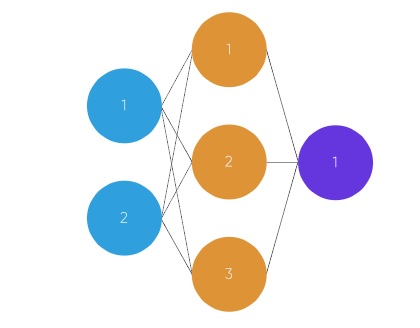Python 中的单神经元神经网络
神经网络是深度学习非常重要的核心;它在许多不同领域都有许多实际应用。如今,这些网络被用于图像分类、语音识别、目标检测等。
让我们来了解一下它是什么以及它是如何工作的?
这个网络有不同的组件。它们如下所示 -
- 输入层,x
- 任意数量的隐藏层
- 输出层,ŷ
- 每层之间的一组权重和偏差,由 W 和 b 定义
- 接下来是为每个隐藏层选择激活函数,σ。
在此图中,展示了 2 层神经网络(在计算神经网络中的层数时,通常不包括输入层)

在此图中,圆圈代表神经元,线条代表突触。突触用于将输入和权重相乘。我们将权重视为神经元之间连接的“强度”。权重定义了神经网络的输出。
以下是简单的前馈神经网络工作原理的简要概述 -
当我们使用前馈神经网络时,我们必须遵循一些步骤。
首先将输入作为矩阵(数字的二维数组)
接下来是将输入乘以一组权重。
接下来应用激活函数。
返回输出。
接下来计算误差,它是数据期望输出与预测输出之间的差值。
并且权重会根据误差稍作调整。
为了训练,这个过程会重复 1,000+ 次,并且训练的数据越多,我们的输出就会越准确。
学习时间,睡眠时间(输入)测试分数(输出)
2, 992 1, 586 3, 689 4, 8?
示例代码
from numpy import exp, array, random, dot, tanh
class my_network():
def __init__(self):
random.seed(1)
# 3x1 Weight matrix
self.weight_matrix = 2 * random.random((3, 1)) - 1
defmy_tanh(self, x):
return tanh(x)
defmy_tanh_derivative(self, x):
return 1.0 - tanh(x) ** 2
# forward propagation
defmy_forward_propagation(self, inputs):
return self.my_tanh(dot(inputs, self.weight_matrix))
# training the neural network.
deftrain(self, train_inputs, train_outputs,
num_train_iterations):
for iteration in range(num_train_iterations):
output = self.my_forward_propagation(train_inputs)
# Calculate the error in the output.
error = train_outputs - output
adjustment = dot(train_inputs.T, error *self.my_tanh_derivative(output))
# Adjust the weight matrix
self.weight_matrix += adjustment
# Driver Code
if __name__ == "__main__":
my_neural = my_network()
print ('Random weights when training has started')
print (my_neural.weight_matrix)
train_inputs = array([[0, 0, 1], [1, 1, 1], [1, 0, 1], [0, 1, 1]])
train_outputs = array([[0, 1, 1, 0]]).T
my_neural.train(train_inputs, train_outputs, 10000)
print ('Displaying new weights after training')
print (my_neural.weight_matrix)
# Test the neural network with a new situation.
print ("Testing network on new examples ->")
print (my_neural.my_forward_propagation(array([1, 0, 0])))输出
Random weights when training has started [[-0.16595599] [ 0.44064899] [-0.99977125]] Displaying new weights after training [[5.39428067] [0.19482422] [0.34317086]] Testing network on new examples -> [0.99995873]

广告

 数据结构
数据结构 网络
网络 关系型数据库管理系统
关系型数据库管理系统 操作系统
操作系统 Java
Java iOS
iOS HTML
HTML CSS
CSS Android
Android Python
Python C 编程
C 编程 C++
C++ C#
C# MongoDB
MongoDB MySQL
MySQL Javascript
Javascript PHP
PHP